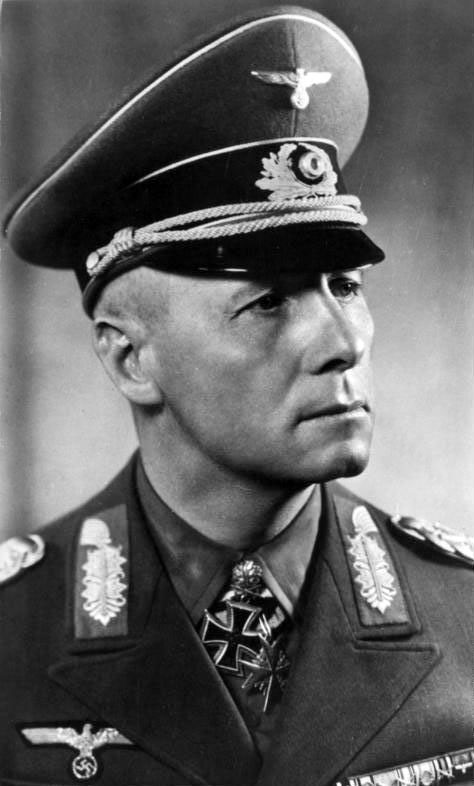Erwin Rommel
Erwin Rommel, ‘the desert fox’, was a celebrated German Field Marshall who led the Afrika Korps during the Desert War. He was implicated in the July Bomb Plot of 1944. When Rommel’s involvement came to light, he was forced to commit suicide.
Rommel was born on 15 November 1891. He graduated from the Officer Cadet School in 1911. During World War One, he distinguished himself in the German Third Army and was decorated for bravery and leadership. After the war, Rommel stayed on in the army as an infantry officer and instructor.
By 1938, Rommel was a senior military figure in the Wehrmacht. His success in the invasions of Poland and Western Europe lead to his appointment as commander of the Afrika Korps in 1941.

Rommel became known as the ‘Desert Fox’ in North Africa. He was greatly feared by the British. Auchinleck, Rommel’s opposite number, even expressed concerns that Allied troops in North were overly fearful of Rommel. In a memo, he recommended that his senior commanders in North Africa persuade their men that Rommel was less a ‘super military leader’ and more a normal German commander.
Rommel believed that prisoners of war should be well looked after. This earned him the respect of Allied Leaders. According to one story, Italian troops took from British POWs’ watches and other valuables. When Rommel got wind of this, he ordered that the valuables be returned to their owners immediately.
In June 1941, Rommel successfully repelled Operation Battleaxe, an Allied attack which aimed at removing Axis forces from Eastern Cyrenaica. From May - June, he commanded the Afrika Korps at the Battle of Gazala. His clever tactics led his forces to victory, and on 21 June the vital Port of Tobruk fell to Axis troops.
After this resounding victory, Rommel’s forces began to struggle. The First Battle of Alamein (July 1942) ended in stalemate, but the Second Battle of El Alamein (October-November 1942) resulted in a resounding Allied victory. The odds were against Rommel, who was starved of fuel and supplies. Due to their control of the Suez canal, the British were abundantly supplied, and Montgomery was fed parts of Rommel’s battle plan by Bletchley Park. The Afrika Korps were defeated in a pivotal battle which turned the tide of the Desert War. Hitler ordered Rommel to fight to the last man and the last bullet, but Rommel had too much respect for his men to obey this command. He retreated, and in May 1943 the Germans left North Africa.
In February 1944, Hitler appointed Rommel commander of the defences of the Atlantic Wall. Rommel was charged with ensuring that Western Europe was impregnable. He took full responsibility for the Northern French coastline. The beaches at Normandy were littered with anti-tank traps which were invisible at full-tide. At the time of D-Day, Rommel commanded Army Group B.
However, the vast Allied attack at D-Day (June 1944) rendered Rommel’s defenses futile. In July 1944, Rommel was wounded in an attack on his car by Allied fighter planes near St. Lo.
Rommel was implicated in the July 1944 Bomb Plot against Hitler. When his involvement came to light, Hitler was keen to avoid an embarrassing public trial of his most famous general. Rommel was given a choice. If he committed suicide, he would be given a state funeral and his family would be provided for. If he refused to do so, he would be executed after a trial at the People's Court and his staff would be rounded up and killed. Rommel opted for the former and died by swallowing a cyanide pill on 14 October 1944. The public were told that Rommel had died from his wounds and a national day of mourning was announced.
In the third volume of his Second World War memoirs, Winston Churchill wrote:
“Rommel deserves our respect, because although a loyal German soldier, he came to hate Hitler and all his works, and took part in the conspiracy to rescue Germany by displacing the maniac and tyrant. For this he paid the forfeit of his life. In the sombre wars of modern democracy, there is little place for chivalry.”
MLA Citation/Reference
"Erwin Rommel". HistoryLearning.com. 2025. Web.
